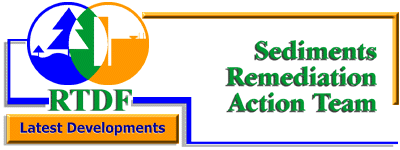|
The Action Team has developed subgroups to focus on the
following three areas of interest:
- Assessment—This area includes the evaluation of
hazard, stress, and exposure resulting from sediment-associated contaminants.
Information required for the human and ecological risk assessment paradigms
includes (but is not limited to) toxicity, transport, and the ability of the
sediment (biotic and abiotic) to naturally attenuate the contaminants.
- In Situ Containment/Capping—In situ
capping as a remediation alternative involves placement of a covering or cap of
clean isolating material (e.g., sediment, sand, gravel, geotextiles, etc.) over
a deposit of contaminated sediment to isolate it physically and chemically from
the aquatic environment.
- In Situ Treatment—A number of in
situ remediation technologies are under consideration by the subgroup,
including natural attenuation, phytoremediation, introduction of chemical
additives to enhance the natural processes, and electrokinetics. The subgroup
is most interested in passive technologies that will remediate the contaminants
without significantly increasing the stress on the ecology.
The efforts of the three subgroups will be coordinated to create
a cohesive research team.


Sponsored by the Technology Innovation Program
Date Last Modified:
|


![]()
![]()